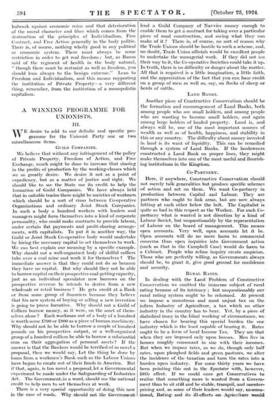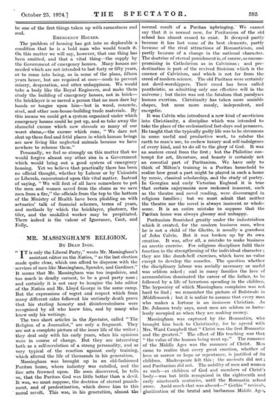A WINNING PROGRAMME FOR UNIONISTS.
AvE desire to add to our definite and specific pro- gramme for the Unionist Party one or two miscellaneous items.
GUILD COMPANIES.
We believe that without any infringement of the policy of Private Property, Freedom of Action, and Free Exchange, much might be clone to increase that sharing in the profits of production by the working-classes which we so greatly -desire. We desire it not as a point of expediency, but as a matter of justice and right. We should like to see the State use its credit to help the formation of Guild Companies. We have always held that in suitable trades there might be societies of workmen which should be a sort of cross between Co-operative Organizations and ordinary Joint Stock Companies. In such a body a hundred workers with leaders and managers might form themselves into a kind of corporate personality, who could make contracts to provide labour, under certain flat payments and profit-sharing arrange- ments, with capitalists. To put it in another way, the Guild or Joint Stock Co-operative body would undertake by hiring the necessary capital to set themselves to work. We can best explain our meaning by a specific example. Why should not a well-organized body of skilful colliers take over a coal mine and work it for themselves ? The immediate answer is that they could not do so because they have no capital. But why should they not be able to borrow capital on their prospective coal-getting capacity, just as an individual speculator now borrows on the prospective revenue he intends to derive from a new wholesale or retail business ? He gets credit at a Bank or from some group of financiers because they believe that his new system of buying or selling a new invention is going to prove lucrative. Why should not a Guild of Colliers borrow money, as it were, on the asset of them- selves alone ? Each workman out of a body of a hundred is worth some £700 or 1800 as a piece of human machinery. Why should not he be able to borrow a couple of hundred pounds on his prospective output, or a well-organized group of a hundred colliers be able to borrow a substantial sum on their aggregation of personal assets? If the answer is that the Bankers would be terrified of so novel a proposal, then we would say, Let the thing be done by loans from a workmen's Bank such as the Labour Unions have begun to create out of their funds in America. But if that, again, is too novel a proposal, let a Governmental experiment be made under the Safeguarding of Industries Act. The Government, in a word, should use the national credit to help men to set themselves at work.
- There is a very special opportunity of doing this now in the case of roads. Why should not the Government, lend a Guild Company of Navvies money enough to enable them to get a contract for taking over a particular piece of road construction, and seeing what they can make of it ? There is, of course, no sort of reason why - the Trade Unions should be hostile to such a scheme, and, no doubt, Trade Union officials would be excellent people to undertake the managerial work. If they did not see their way to it, the Co-operative Societies could take it up., In truth, there is no difficulty or danger about the matter. All that is required is a little imagination, a little faith, and the appreciation of the fact that you can, base credit on a group of men as well as, say, on flocks of sheep or- herds of cattle.
LAND BANKS.
Another piece of Constructive Conservatism should be the formation and encouragement of Land Banks, both among people who are small holders, and among people who are wanting to become small holders, and again among large holders of landed property. Land is, and always will be, one of the most important sources of wealth as well as of health, happiness, and stability in this or any country. The difficulty about money invested in land is its want of liquidity. This can be remedied - through a system of Land Banks. H the landowners constructed a Land Bank on proper lines, they might make themselves into one of the most useful and flourish- ing institutions in the Kingdom.
CO-PARTNERY.
Here, if anywhere, Constructive Conservatism should not merely talk generalities but produce specific schemes of action -and act on them. We want Co-partnery in production between Capital and Labour. They are partners who ought to link arms, but are now. .always hitting at each other below the belt. The Capitalist is quite as bad in this respect as the Worker.. For such Co- partnery what is wanted is not direction by a kind of Labour Soviet, but unquestionably by the representation of Labour on the board of management. This means open accounts. Very well, open accounts let it be. Open accounts will do no more harm to commercial concerns than open inquiries into Government action (such as that in the Campbell Case) would do harm to a Cabinet. People who refuse inquiry create suspicion. Those who are perfectly willing, as Governments always should be, to grant it, give good ground for confidence and security.
RURAL RATES.
In dealing with the Land Problem of Constructive Conservatism we omitted the immense subject of rural rating because of its intricacy-; but unquestionably our rural rating system ought to be reformed. At present we impose a monstrous and most unjust tax on the infirm Industry of Agriculture, a tax which no other- industry in the country has to bear. Yet, by a piece of diabolical irony in the blind working of circumstance, we have chosen for bearing this special burden the one- industry which is the least capable of bearing it. Rates ought to be a form of local Income Tax. They are that when they are imposed only upon houses. Men live in. housesroughly consonant in size with their incomes. But when we impose rates, as we do, though only half rates, upon ploughed fields and green pastures, we alter the incidence of the taxation and turn the rates into a burden upon industry. For some thirty years we have. beenpointing this out in the Spectator with, however, little effect. If we could once get Conservatives to realize that something more is wanted from a Govern-, ment than to sit still and be stable, tranquil, and unenter- prising and, as some of their leaders -would say, unsensa- tional, Rating, and its ill-affects Agriculttrre would be one of the first things taken up with earnestness and zeal.
EMERGENCY HOUSES.
The problem of housing has got into so deplorable a condition that he is a bold man who would touch it. On this matter we will say, however, that one thing has been omitted, and that a vital thing—the supply by the Government of emergency houses. Many houses are needed which are not intended to last forty or fifty years, or to come into being, as in some of the plans, fifteen • years hence, but are required at once—roofs to prevent misery, desperation, and utter unhappiness. We would take a body like the Royal Engineers, and make them study the building of emergency houses, not in brick- -the bricklayer is so sacred a person that no man dare lay hands or tongue upon him—but in wood, concrete, steel, and other non-house-building trade materials. By this means we could get a system organized under which emergency houses could be put up, and so take away the shameful excuse which now shrouds so many of our worst slums,—the excuse which runs, "We dare not . shut up these foul and fetid places in which human beings are now living like neglected animnls because we have nowhere to rehouse them."
Personally, we feel so strongly on this matter that we would forgive almost any other sins in a Government which would bring out a good system of emergency housing. Yet we believe that practically there has been no official thought, whether. by Labour or by Unionists or Liberals s concentrated upon. this vital matter. Instead of saying, "We will first of all have somewhere to put the men and women saved from the slums as we save men from a fire," the officials from the top to the bottom of the Ministry of Health have been plodding on with actuaries' talk of financial schemes, terms of years, and methods by which the bricklayer, plasterer, the tiler, and the unskilled worker may be propitiated. There indeed is the valour of Ignorance, Cant, and



























































 Previous page
Previous page